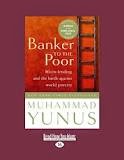"The Tyranny of the Urgent", a little 4-page pamphlet written by Charles Hummel of Intervarsity Christian Fellowship back in 1967. This seems to be before some of the "important" vs. "urgent" thinking of people like Stephen Covey. It is a basic principle in management -- stick to the plan (the important) in spite of the immediate need (the urgent). I thought this might be a helpful principle to carry to Malawi (you know, pale guy from the west tells black village how to live :-) ). But this really caught my eye:

The second, not yet finished is "Banker to the Poor" the remarkable story of how Muhammad Yunus started the Grameen bank (literally "bank of the village") in Bangladesh creating what is now known a "micro-finance". These are loans to poor, illiterate people, with no collateral. For this, he (and the bank) won the 2006 Nobel prize. So far, it is a compelling story of how a little money, support and a lot of hard work can give people a path to freedom from systemic, oppressive, poverty.
My interest?: is micro-credit a possible tool for our community in Malawi. So far, its pretty clear that just giving money is not the answer.
 And what do you think the repayment rate is for microfinance loans through the Grameen bank (or Kiva)?
And what do you think the repayment rate is for microfinance loans through the Grameen bank (or Kiva)?
And what do you think the standard interest rate is for the Grameen bank?
Both answers will surprise you ... but more on that in the next post, when we introduce you to Cichlids.
I find this completely remarkable. Surely there were just a few loose ends? I haven't got this figured out, but it tells me that Jesus upside-down kingdom has a different idea of finished. We aren't going with the idea of "finishing" anything, but Jesus idea of "finishing" is still a call for us to look at things from his upside-down kingdom point of view.On the night before He died, Jesus made an astonishing claim. In the great prayer of John 17 He said, ‘I have finished the work which Thou gavest Me to do.' (verse 4).How could Jesus use the word "finished"? His three-year ministry seemed all too short. A prostitute at Simon's banquet had found forgiveness and a new life, but many others still walked the street without forgiveness and a new life. For every ten withered muscles that had flexed into health, a hundred remained impotent. Yet on .that last night, with many useful tasks undone and urgent human needs unmet, the Lord had peace; He knew He had finished God's work.

The second, not yet finished is "Banker to the Poor" the remarkable story of how Muhammad Yunus started the Grameen bank (literally "bank of the village") in Bangladesh creating what is now known a "micro-finance". These are loans to poor, illiterate people, with no collateral. For this, he (and the bank) won the 2006 Nobel prize. So far, it is a compelling story of how a little money, support and a lot of hard work can give people a path to freedom from systemic, oppressive, poverty.
My interest?: is micro-credit a possible tool for our community in Malawi. So far, its pretty clear that just giving money is not the answer.
 And what do you think the repayment rate is for microfinance loans through the Grameen bank (or Kiva)?
And what do you think the repayment rate is for microfinance loans through the Grameen bank (or Kiva)?And what do you think the standard interest rate is for the Grameen bank?
Both answers will surprise you ... but more on that in the next post, when we introduce you to Cichlids.
Hey Richard,
ReplyDeleteThat has been my prayer lately ... Lord, show me what you are asking me to do so I can say those words, I have completed all you asked me to do. To often my personal expectations and others obligations cloud my understanding of the truly divine assignments. Like you, hoping to grow in my understanding of that prayer ... I am sure Malawi will give you a new perspective on this as well. (LN)
I too am touched and challenged by Jesus' prayer...while He took on human form for 33 years, he certainly lived a life vastly different than I!!! Imagine being so "one" with my Father that I could say AND believe such words!!!!!!
ReplyDeleteBlessings on you and Ingrid and the mission God has for you both. Juanita